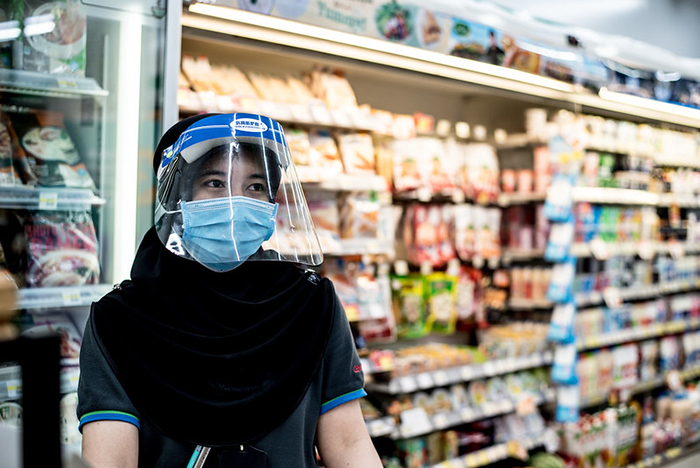$1.5 Billion ADB Loan to Support Thailand's COVID-19 Response

Areenee Jasiti is a store assistant manager in Thailand where convenience stores have remained open, despite COVID-19. Convenience stores are one of Thailand's lifelines. Photo: UN Women/Ploy Phutpheng (CC BY-NC-ND 2.0)
The Asian Development Bank (ADB) is providing a $1.5 billion loan to support the Government of Thailand’s response to the coronavirus disease (COVID-19) pandemic.
“ADB is committed to providing timely support to Thailand and helping reduce the pandemic’s social and economic impacts on the country,” said ADB President Masatsugu Asakawa. “Our budget support will help fund the government’s relief packages, which aim to better prepare the country’s health care system for possible future waves of COVID-19; protect the vulnerable; support small and medium-sized enterprises (SMEs) in industries most affected by the outbreak such as tourism and manufacturing; and provide overall economic stimulus.”
Thailand has one of the more developed health care systems in Southeast Asia, but the country remains highly vulnerable to the pandemic due to its deep integration with regional and global economies. Potential surges in COVID-19 cases could overwhelm the system, resulting in constraints in human resources and medical equipment.
ADB forecast Thailand’s economy to contract by 6.5% in 2020, down from its December 2019 projection of 3.0% growth. Given the country’s strong regional trade, investment, and labor links, an economic crisis in Thailand could spill over into neighboring countries, including Cambodia, the Lao People’s Democratic Republic, Myanmar, and Viet Nam.
“ADB is a trusted development partner in Thailand for many years,” said Thailand’s Deputy Minister of Finance and acting Minister of Finance Santi Promphat. “In working closely with ADB, we believe that ADB support to member economies, including Thailand, in response to the COVID-19 pandemic would alleviate social and economic impact in Thailand and the region.”
A loan agreement is expected to be signed by representatives from ADB and the Ministry of Finance by the end of August in Bangkok.
ADB’s COVID-19 Active Response and Expenditure Support (CARES) Program will provide quick-disbursing budget support for the government’s COVID-19 response. It will help restore growth and set the stage for targeted private sector operations by ADB to support the government’s post-COVID-19 recovery, including priority areas such as infrastructure, trade, and supply chain finance. In addition, ADB will set up a framework to support continuing policy dialogue with the government on COVID-19 response and economic recovery.
The CARES Program is funded through the COVID-19 pandemic response option (CPRO) under ADB’s Countercyclical Support Facility. CPRO was established as part of ADB’s $20 billion expanded assistance for developing member countries’ COVID-19 response, which was announced on 13 April.
Government stimulus packages have totaled 2.25 trillion baht (about $72 billion) for fiscal years 2020 and 2021. That includes about 1.2 trillion baht for fiscal programs that are providing cash assistance to 16 million informal workers and 10 million farmer households; supporting the economic and social recovery; and strengthening the health care system. SMEs in tourism and other sectors are provided tax incentives, as well as soft loans and debt suspension from the central bank. The government also drew up a post-COVID-19 economic recovery plan. ADB estimates the fiscal programs could increase economic output by 1.6 trillion baht, or 10.1% of gross domestic product.
ADB is preparing a new country partnership strategy with Thailand, which will support the economic recovery with a pipeline of green and climate-resilient infrastructure projects. The strategy will also focus on rebuilding regional cooperation through the Greater Mekong Subregion working groups on tourism, trade, transport, and health.
ADB is committed to achieving a prosperous, inclusive, resilient, and sustainable Asia and the Pacific, while sustaining its efforts to eradicate extreme poverty. Established in 1966, it is owned by 68 members—49 from the region.
This news was first published on the ADB website.
Last Updated: 5 August 2020
